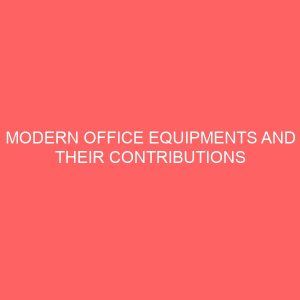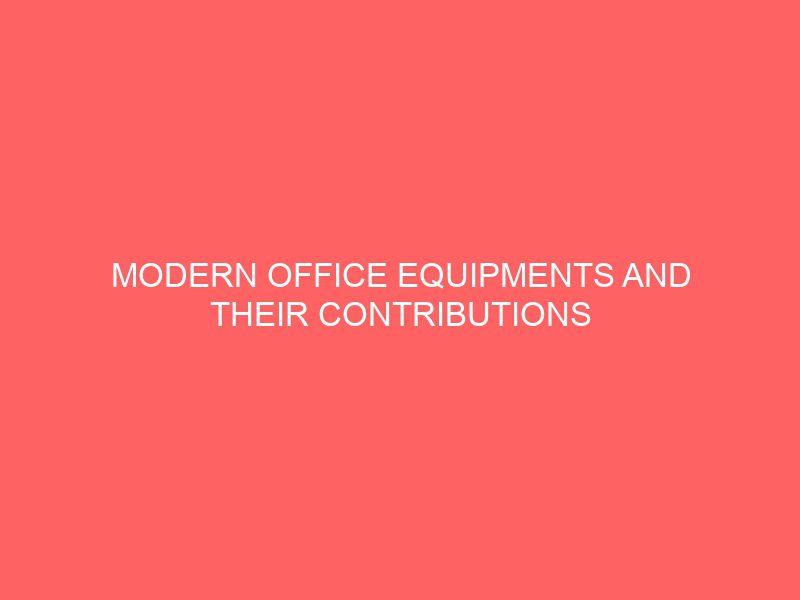Description
CHAPTER ONE
INTRODUCTION
1.1 Background of the Study
The use of modern office equipment is inevitable to offices in this modern era- until the 15th century before the advent of typewriters, publication of business documents was a difficult job and bored mostly to secretaries because everything has to be handwritten.
With time and technological growth, business organizations witnessed information overload due to over increasing commercial transactions. Business therefore, needs technology to turn out words effectively, efficiently and continuously.
These days, the world of work is changing fast, as we approach the new millennium modern equipment are fast replacing manual machines in the workplace, computer automated machines have gradually taken the work of men. With the level of sophistication and cut throat competition in our society, nobody is resting on their oars in the new technological age.
Before now, most employers of labour needed all kinds of categories of workers. Some were trained on the job, while others came as experts. In the factories, people were employed in their thousands to do all kinds of jobs. Production machines, acquired long age, took time to warm up for use while workers took their turn in churning out the large number of workforce.
Most management, employers of labour are of the view that the introduction of high technology to the workplace has made the work easier, faster, saves time and cost, especially on overhead, better than employing a multitude with no result.
Again, with the introduction of new technologies, business men have been saved from carrying huge sums of money all over the place, the advent of electronic fund transfer is a pointer to this topic.
The use of internet, E-mail, pagers, digitized telephone services, mobile phones, answering machines have made the job of executive, top managers less cumbersome and communication gap has been bridged with the popularization of these gadgets. Business and transactions can be discussed through these services.
Even in terms of society for the workplace it is common feature in some big organization to mount circuit television, to monitor movement of people. Big time executive also use close circuit television to wade off intruders and those they donÕt want to see, with this, productivity is thus enhanced.
Brief History of Nigerian National Petroleum Corporation (NNPC) Enugu Depot
NNPC (Nigerian National Petroleum Corporation) depot Enugu is located at Emene `in Enugu East local government of Enugu state. Commissioned on 25th August, 1979 by the military Administration of the then Anambra state Col. D.S Abubakar.
It has a total capacity of 12 million liters of petroleum products. It has only three by products in stock which include Premium Motor Sprit (PMS) otherwise called petrol, Dual Purpose Kerosene (DPK) and Automobile Gas Oil (AGO) ago or diesel for onward distribution to her customers the oil marketing companies.
Enugu depot has a total number of six departments namely: Administrative, sales, security, accounts operation and safely departments with a total workforce of 250 workers. Each department is managed by the head of such department who equally reports to the depot manager who is the overall boss.
1.2 Statement of the Problem
In a developing country like Nigeria, the use of modern office equipment in the office is still minimal because they lack the technical know how to put the one their disposal to good use. Lack of stilled manpower to update and maintain already acquired machines. Besides, constant power failure from the public electricity supply has not helped matters in any way.
More over, some office worker especially secretaries sees the technological improvement as a challenge and also as threat to their job. These problems and anxiety in the minds of office workers, is likely to lead to a drastic reduction in production in most office.
Finally, this situation calls for serious policies by management dealing with the problem, which psychologically destroys the mental and emotional state of workers.
1.3 Purpose of the Study
For every act, there must be a reason and in light of this, the purposes of this study are:
1. To discover what office equipment is all about.
2. To identify the contributions of modern office equipment on the success of business organization.
3. To examine the training needed for the operation of these office equipments.
4. To identify how to maintain them in the office.
5. To discover the problems associated with the use of these equipments.
1.4 Research Question
1. What is office equipment all about?
2. Do these modern office equipments actually have any contribution on the success of business organization?
3. Do the operation of these modern equipments need any training program?
4. Do these modern office equipments require proper maintence?
5. Is there any problem associated with the use of these modern equipments?
1.5 Significance of the Study
The significance of this study Òmodern office equipments and their contributions to the success of a business organization, a case study of NNPC Enugu depotÓ is that it will create awareness as well provide information on the roles these modern office equipment plays in seeing that NNPC Enugu depot achieve their goals and also meet up the standard. It is also recommended to the society in general and whosoever wishes to achieve efficiency on prudent.
1.6 Scope of the Study
The researcher is concerned with the contributions of modern office equipments to the success of business organization with particular reference to Nigerian National Petroleum Corporation (NNPC) Enugu depot in Enugu east local government area in Enugu state.
1.7 Definition of Terms
? Office: it is a place /room /building where clerical duties are carried out.
? Modern: involving up-to-date techniques or equipment. it is also refers as most recent or current
? Equipment: the tools / items needed for a particular purpose. In order words, it also means things that are needed to carry out work / job in the office; it could be electrical or manual.
? Researcher: person that carry out the piece of work.
? Accuracy: error free presentation.
? Machine: a device with an electrical power attached to it used in office production.
? Crude/Manual: equipment that require physical exertion of energy to operate.
? Efficiency: prompt delivering of jobs.
? Business: knowledge of commercial procedures i.e. buying and selling.
? Operation: the manner in which business is carried out.
? Production: output, increase in manpower.
? NNPC: Nigerian National Petroleum Corporation
?
CHAPTE







